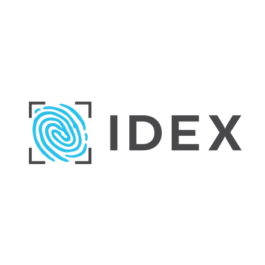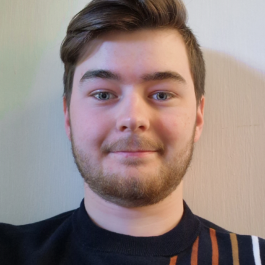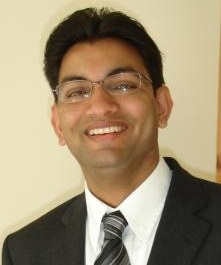IDEX Biometrics
We invent, engineer and commercialise secure, yet incredibly user-friendly, solutions. IDEX Biometrics
Our Scholarships
Placement Location
Farnborough
Type of Placements Offered
• Summer placements • 6-month MEng placements
Restrictions/Notes
(1) Students must be in the penultimate year of their degree; (2) No 12-month placements
2024/25 Scholarships
We are not offering any new scholarships this year
Who we are and what we do

IDEX Biometrics is the leading provider of fingerprint identification technologies, offering simple, secure and personal authentication for all. We help people make payments, prove their identity, gain access to information, unlock devices or gain admittance to buildings with the touch of a finger. We invent, engineer and commercialise these secure, yet incredibly user-friendly, solutions. Our total addressable market represents a fast-growing multi-billion-unit opportunity.
What you could be doing during your work placement
A placement with IDEX Biometrics will provide an opportunity for the following experience:
- Working in a fast-paced, highly innovative team environment on cutting edge biometric technology.
- Design and development of fingerprint sensors incorporating custom ASIC, MCU and power management circuitry.
- System level design and simulation using tools such as Matlab, C#, .NET and Python.
- Embedded software development for sensor, production testing and system level tools.
- Sensor and system test, characterisation and verification.
- Familiarity with payment ecosystem technologies including Contactless/NFC, secure elements, security standards.
Meet one of our Scholars

Name: Angus
Sponsor: IDEX
University: University of Manchester
Degree Course: MEng Mechatronic Engineering
What appeals to you about Electronics?
I got into electronics by experimenting with robots and circuits as a child growing up. However, I only ended up taking Mechatronics after I received a visit from an Electrical Engineering student at College. I enjoy working in electronics because of the layers of abstraction that allow what are essentially just electrons flowing through a conductor to perform extraordinary tasks.
Why did you want a scholarship with IDEX?
IDEX appealed to me because it was an area of electronics I had never worked with before, and it intrigued me because it was this new technology that I wanted to understand and experiment with. Working at IDEX has allowed me to appreciate how complicated it can be to pay using a credit card! I also wanted to work for a smaller company as I hoped this would be more of a personal experience.
What type of work have you been involved with during your placement?
During my time at IDEX I worked with the System Validation Team, building an AI computer vision system to track the orientation and position of an IDEX card as a person used it to interact with a terminal. The team provided me with immense support throughout my internship, especially as my supervisor was a UKESF Scholar herself. The project was specifically selected by IDEX for me, which allowed me to work on something that aligned with my skillset and interests whilst also developing a system that was useful and useable for the company. I felt this enabled me to really excel at my internship.
What are your interests outside of work?
My interests at university include robotics, climbing and sailing. I actually used skills I learnt at IDEX to write automation scripts that allowed me to cut my robotics society workload by 90%, this means I now have more time to climb at my local gym.
Meet two of our Engineers

Name: Nivrutti
Job Title: Senior Engineer, Firmware Architecture
Why I chose to work at IDEX
Prior to IDEX, my work opportunities had allowed me to gain significant knowledge in Smartcard domain, and I had been focused on the design & development of biometrics access control systems in my most recent position. While I was exploring new opportunities, IDEX was a natural choice as it provided me the right platform to build on my experience in these areas. I have worked at IDEX for almost two years and, during this time, my role has provided me diverse and challenging work every day. The best part for me personally has been the satisfaction when I get something working for the very first time.
What I do
As a member of System Engineering Group, I have been involved in diverse activities that involve both hardware and software. Primary responsibilities of my role involve the design & development of firmware application for some of the most advanced and complex Secure Elements in the market that we have short-listed for our systems. I am also responsible for the implementation, measurement and analysis of advanced power-management techniques for Secure Elements and MCUs in our system, and I liaise closely with other teams within IDEX, customers, vendors and technology partners.
My background and advice for current students
I have a Master’s degree in Instrumentation from the University of Pune, India. As a part of the final year curriculum, I did a placement in industry for six months. I chose to work in small establishment where I got the opportunity to carry out more hands-on work, which proved to be right decision. After my graduation, I was offered a full-time role as a design engineer in the same company. I worked there for three years before moving into a larger company. My advice to current students is that to build a successful career, you need to develop a passion in your chosen field and have the determination to follow that passion and most importantly enjoy your work.

Name: Raphaël
Job Title: Software Engineer
Why I chose to work at IDEX
Before joining IDEX, I was working in France for a medical start-up. When searching for opportunities in the UK, I was looking for a company which had the potential to bring me a lot of experiences and challenges in embedded systems. That is what I found in IDEX; now my role allows me to work with brilliant people on cutting-edge technologies.
What I do
As a member of Software Engineering Group, my activities are in the design and development of firmware for low power microcontroller, implementation of security mechanisms and communication protocol, while taking into account power consumption, robustness and potential security vulnerabilities. Since embedded software development is at the border between hardware and software, I also work closely with other teams on common issues or design discussion.
My background and advice for current students
I have a Master of Computer Science from a private French university. During my end-of-degree internship, I did a placement for six months in a small company. This was my very first experience in embedded systems, and I got the opportunity to be in charge of my own software module and meet people who mentor me. I was offered a full-time position as a software engineer after my graduation, and worked there for two years. I would advise current students to carefully choose the placement company and prioritise experience over compensation.